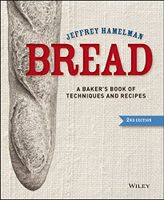Advertisement
Poolish
Appears in
Published 2004
Poolish is a mixture of equal weights flour and water, with a very small portion of yeast added (in the .08 to 1 percent range, depending on how long the poolish will ripen before the final dough is mixed, and the temperature of the room in which the poolish will ripen). Being of equal weight in flour and water, it has 100 percent hydration—more like a batter than a dough. Salt is not included in poolish. Protease is an enzyme whose function is to hydrolyze protein. This has the effect of increasing the extensibility of bread dough, which not only makes shaping easier (though perhaps harder during the early stages of hand-skill development), but also results in increased loaf volume. In a loose mixture like poolish, protease activity is relatively high (firmer pre-ferments exhibit lower protease activity). The aroma of a bowl of ripe poolish is intoxicating—sweet and nutty with a delicate hint of acidity— and the texture of the dough is beautifully silken, a true delight for the hands. As the name suggests, poolish is of Polish origin. Originally used in pastry production, it eventually found a place in bread making, and today is used by bakers around the world.

